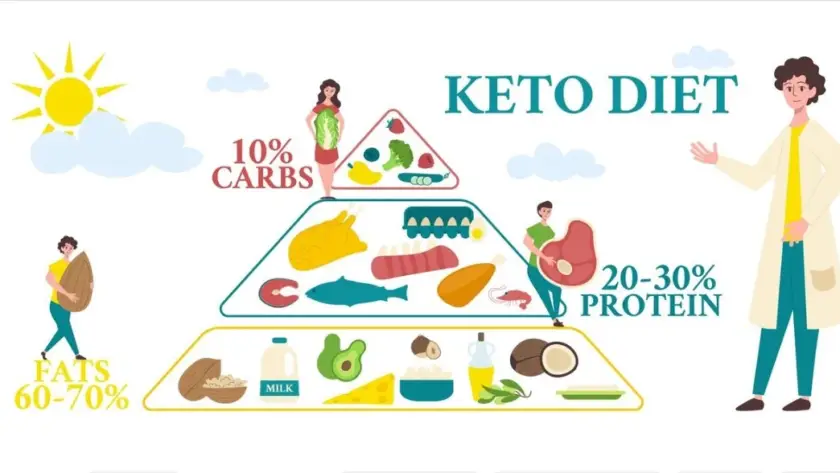keto diet and its benefits
Are you tired of trying countless diets with little to no results? Do you find yourself constantly battling cravings and energy crashes throughout the day? If so, you’re not alone. Millions of people struggle with weight management and overall health issues, desperately seeking a solution that works.
In this blog post, we’ll dive deep into the world of keto, exploring its fascinating science and uncovering the truth behind its popularity. From understanding the basics of the diet to discovering its wide-ranging benefits and learning how to get started, we’ll cover everything you need to know about this game-changing nutritional approach. So, buckle up and get ready to transform your health with the power of keto!
Understanding the Keto Diet

A. Definition and core principles
The ketogenic diet, commonly known as the keto diet, is a high-fat, low-carbohydrate eating plan designed to shift the body’s metabolism into a state of ketosis. In this metabolic state, the body burns fat for fuel instead of carbohydrates, leading to potential health benefits and weight loss.
B. Macronutrient breakdown
The keto diet typically follows this macronutrient distribution:
| Macronutrient | Percentage of daily calories |
| Fat | 70-75% |
| Protein | 20-25% |
| Carbohydrates | 5-10% |
This drastic reduction in carbohydrates forces the body to rely on fat for energy, promoting ketone production in the liver.
C. Foods to eat and avoid
To maintain ketosis, it’s crucial to choose the right foods:
Foods to eat:
- Healthy fats (avocados, olive oil, nuts)
- Protein sources (meat, fish, eggs)
- Low-carb vegetables (leafy greens, broccoli, cauliflower)
Foods to avoid:
- Grains and starches
- Sugar and sweetened beverages
- Most fruits
- High-carb vegetables (potatoes, carrots)
D. Comparison with other low-carb diets
While the keto diet shares similarities with other low-carb diets, it differs in key aspects:
- Atkins Diet: Allows for gradual carb increase over time
- Paleo Diet: Focuses on whole foods but doesn’t strictly limit carbs
- Low-carb Mediterranean: Emphasizes healthy fats but includes more carbs than keto
The keto diet’s strict carb limitation sets it apart, aiming to maintain a consistent state of ketosis for maximum benefits.
Now that we’ve covered the fundamentals of the keto diet, let’s explore its primary benefit: weight loss.
Benefits of Keto Diet
1-Weight Loss Benefits

One of the most sought-after benefits of the keto diet is its potential for significant weight loss. Let’s explore how this low-carb, high-fat eating plan can help you shed those extra pounds.
How ketosis promotes fat-burning
Ketosis, the metabolic state induced by the keto diet, is a powerful fat-burning mechanism. When your body enters ketosis, it shifts from using glucose as its primary energy source to burning fat for fuel. This process leads to:
- Increased fat oxidation
- Reduced fat storage
- Enhanced metabolic flexibility
Appetite suppression effects
The keto diet has a natural appetite-suppressing effect, making it easier for individuals to maintain a calorie deficit. This is due to:
- Higher protein and fat intake, which increase satiety
- Stabilized blood sugar levels, reducing cravings
- Hormonal changes that affect hunger signals
Long-term weight management
While many diets lead to initial weight loss followed by regain, the keto diet has shown promise for long-term weight management. Here’s why:
| Factor | Impact on Weight Management |
| Metabolic adaptation | Keto helps preserve metabolic rate during weight loss |
| Sustainable eating habits | Focus on whole foods promotes a healthier lifestyle |
| Improved insulin sensitivity | Better glucose control supports weight maintenance |
Success stories and statistics
The effectiveness of the keto diet for weight loss is backed by numerous success stories and scientific studies. For example:
- A 2020 meta-analysis found that keto dieters lost an average of 2 kg more than those on low-fat diets over 12 months
- Many individuals report losing 10-20% of their body weight within the first 3-6 months on keto
Now that we’ve explored the weight loss benefits of the keto diet, let’s examine how it can improve mental clarity and focus.

Now that we’ve explored the weight loss benefits of the keto diet, let’s dive into another significant advantage: improved mental clarity and focus.
Brain Function on Ketones
When following a ketogenic diet, your brain shifts from using glucose as its primary fuel source to utilizing ketones. This metabolic change can have profound effects on cognitive function:
- Increased energy production
- Enhanced neurotransmitter balance
- Reduced oxidative stress
| Fuel Source | Brain Function |
| Glucose | Fluctuating energy levels, potential insulin resistance |
| Ketones | Steady energy supply, improved neuronal efficiency |
Potential Cognitive Benefits
The keto diet has been associated with several cognitive benefits:
- Improved memory and learning
- Enhanced problem-solving abilities
- Increased mental clarity and alertness
- Better concentration and focus
These improvements may be particularly noticeable in individuals who previously experienced brain fog or difficulty concentrating.
Managing Brain Fog and Mental Fatigue
One of the most reported benefits of the keto diet is the reduction of brain fog and mental fatigue. Here’s how it helps:
- Stabilizes blood sugar levels, reducing energy crashes
- Increases production of GABA, a neurotransmitter that promotes calmness and focus
- Reduces inflammation in the brain, which can interfere with cognitive function
By addressing these factors, the keto diet can help you feel more mentally sharp and energized throughout the day.
Next, we’ll explore how the ketogenic diet can help manage blood sugar and insulin levels, which are crucial for overall health and well-being.
2-Managing Blood Sugar and Insulin Levels
The ketogenic diet has gained significant attention for its potential to effectively manage blood sugar and insulin levels. This aspect of the diet is particularly beneficial for individuals with diabetes or prediabetes, as well as those looking to stabilize their energy levels and reduce sugar cravings.
Impact on diabetes and prediabetes
The keto diet’s low-carb, high-fat approach can have a profound effect on blood sugar management:
- Reduces glucose spikes: By limiting carbohydrate intake, the diet helps prevent sudden increases in blood sugar levels.
- Improves insulin sensitivity: The body becomes more responsive to insulin, allowing for better glucose regulation.
- Lowers HbA1c levels: Many studies have shown a significant reduction in long-term blood sugar markers for diabetics following a ketogenic diet.
| Benefit | Impact on Diabetes | Impact on Prediabetes |
| Blood Sugar Control | Improved daily glucose levels | Potential reversal of the condition |
| Medication Reduction | Possible decrease in insulin needs | May prevent progression to diabetes |
| Weight Management | Aids in weight loss, improving overall health | Helps achieve a healthy BMI, reducing risk factors |
Stabilizing energy levels
One of the most noticeable benefits of managing blood sugar through the keto diet is the stabilization of energy levels throughout the day:
- Elimination of sugar crashes
- Sustained mental clarity and focus
- Improved physical endurance
- Reduced fatigue and lethargy
By relying on fat for fuel instead of carbohydrates, the body experiences a more consistent energy supply, avoiding the highs and lows associated with glucose fluctuations.
Reducing sugar cravings
The keto diet can be an effective tool in combating sugar cravings:
- Balances hormones: Ketosis helps regulate hormones that influence hunger and cravings.
- Breaks the sugar cycle: By drastically reducing sugar intake, the body adapts to lower sugar consumption.
- Provides satisfying alternatives: High-fat foods can be more satiating, reducing the desire for sugary snacks.
As the body adapts to using ketones for energy, many people report a significant decrease in their desire for sugary foods, making it easier to maintain a healthy diet long-term.
3-Other Health Benefits

The ketogenic diet offers a range of health benefits beyond weight loss and improved mental clarity. Let’s explore some of these additional advantages:
A. Reduced inflammation
The keto diet has shown promising results in reducing inflammation throughout the body. This anti-inflammatory effect can potentially help alleviate symptoms of various chronic conditions.
B. Potential cancer-fighting properties
Some studies suggest that the ketogenic diet may have cancer-fighting properties. While more research is needed, early findings are encouraging.
C. Managing neurological disorders
The keto diet has been used for decades to manage epilepsy in children. Recent research indicates it may also benefit other neurological disorders:
- Alzheimer’s disease
- Parkinson’s disease
- Multiple sclerosis
D. Improved skin health
Many individuals report clearer, healthier skin while following a ketogenic diet. This improvement may be due to:
- Reduced inflammation
- Lower sugar intake
- Increased consumption of healthy fats
E. Enhanced athletic performance
Contrary to popular belief, the keto diet can potentially enhance athletic performance, especially in endurance sports. Here’s a comparison of energy sources for athletes:
| Energy Source | Glycogen-Based | Ketone-Based |
| Duration | Short-term | Long-term |
| Consistency | Variable | Steady |
| Recovery time | Longer | Shorter |
While these benefits are promising, it’s important to note that individual results may vary. As we move forward, let’s explore how you can get started with the ketogenic diet to experience these potential benefits for yourself.
Getting Started with Keto
Now that we’ve explored the numerous benefits of the keto diet, let’s dive into how you can embark on this transformative journey.
Transitioning to a keto lifestyle
Transitioning to a keto lifestyle requires careful planning and gradual changes. Here’s a step-by-step approach to help you ease into ketosis:
- Gradually reduce carbohydrate intake
- Increase healthy fat consumption
- Moderate protein intake
- Stay hydrated
- Monitor your body’s response
Meal planning and recipes
Effective meal planning is crucial for success on the keto diet. Here are some keto-friendly meal ideas and a sample daily meal plan:
| Meal | Food Options |
| Breakfast | Avocado and omelet with vegies and sausages |
| Lunch | Grilled chicken salad with olive oil dressing |
| Dinner | Baked salmon with roasted vegetables |
| Snack | Handful of nuts or cheese cubes |
Remember to incorporate a variety of vegetables, healthy fats, and quality proteins into your meals.
Supplements and electrolytes
As your body adjusts to the keto diet, you may need to supplement certain nutrients and maintain electrolyte balance. Consider the following:
- Magnesium
- Potassium
- Sodium
- Omega-3 fatty acids
- MCT oil
Consult with a healthcare professional before starting any new supplement regimen.
By following these guidelines and staying committed, you’ll be well on your way to adopting a successful keto lifestyle and reaping its many benefits.
Conclusion
The keto diet offers a range of potential benefits beyond just weight loss. From improved mental clarity and focus to better blood sugar management and heart health, this low-carb, high-fat eating plan has gained popularity for good reason. By shifting the body into a state of ketosis, the diet can lead to significant improvements in overall health and well-being.
If you’re considering trying the keto diet, it’s essential to approach it with proper knowledge and preparation. Consult with a healthcare professional or nutritionist to ensure it’s suitable for your individual needs and health goals. Remember, while the keto diet can be effective for many, it’s not a one-size-fits-all solution. With the right approach and commitment, you may find that the keto diet is the key to unlocking your optimal health and vitality.






